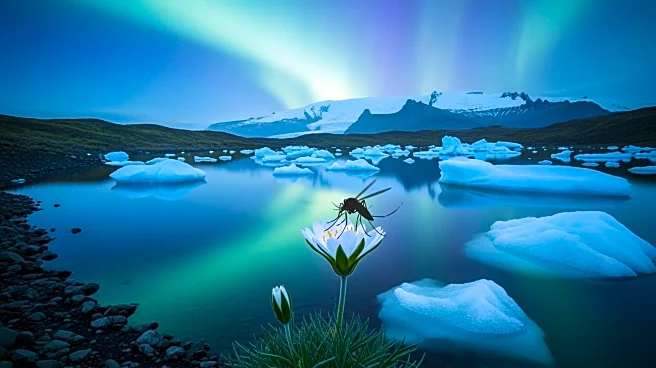What's Happening?
For the first time, mosquitoes have been found in Iceland, a country previously inhospitable to these insects. The discovery was made by citizen scientist Björn Hjaltason, who identified the mosquitoes as Culiseta
annulata, a cold-resistant species. The presence of mosquitoes in Iceland is attributed to the country's warming climate, which is occurring at a rate four times faster than the rest of the Northern hemisphere. This change has made Iceland's marshes and ponds suitable breeding grounds for mosquitoes. The arrival of mosquitoes in Iceland is part of a broader trend of climate change facilitating the spread of invasive species, which can carry diseases such as dengue and Zika virus.
Why It's Important?
The introduction of mosquitoes to Iceland highlights the impact of climate change on global ecosystems. As temperatures rise, regions previously too cold for certain species are becoming viable habitats, leading to shifts in biodiversity. This can have significant implications for public health, as mosquitoes are known vectors for various diseases. The spread of mosquitoes to new areas increases the risk of mosquito-borne illnesses, which can strain healthcare systems and affect local populations. The situation in Iceland serves as a warning of the broader consequences of climate change, emphasizing the need for proactive measures to mitigate its effects.
What's Next?
The discovery of mosquitoes in Iceland may prompt further research into the potential establishment of these insects in the region. Scientists and public health officials may need to monitor mosquito populations and assess the risk of disease transmission. Additionally, this development could lead to increased efforts to address climate change and its impact on ecosystems. Stakeholders, including governments and environmental organizations, may consider implementing strategies to reduce greenhouse gas emissions and protect vulnerable habitats from invasive species.
Beyond the Headlines
The presence of mosquitoes in Iceland raises ethical and environmental questions about human responsibility in climate change. It underscores the interconnectedness of global ecosystems and the unintended consequences of human activities. The situation may also lead to discussions on the importance of citizen science in tracking environmental changes and the role of individuals in contributing to scientific knowledge.










